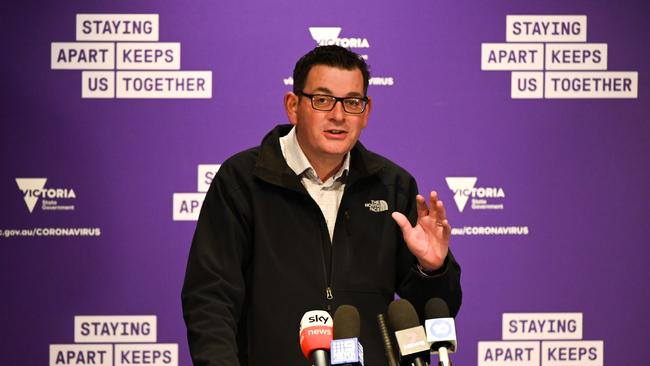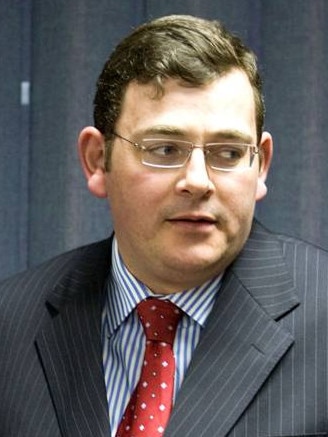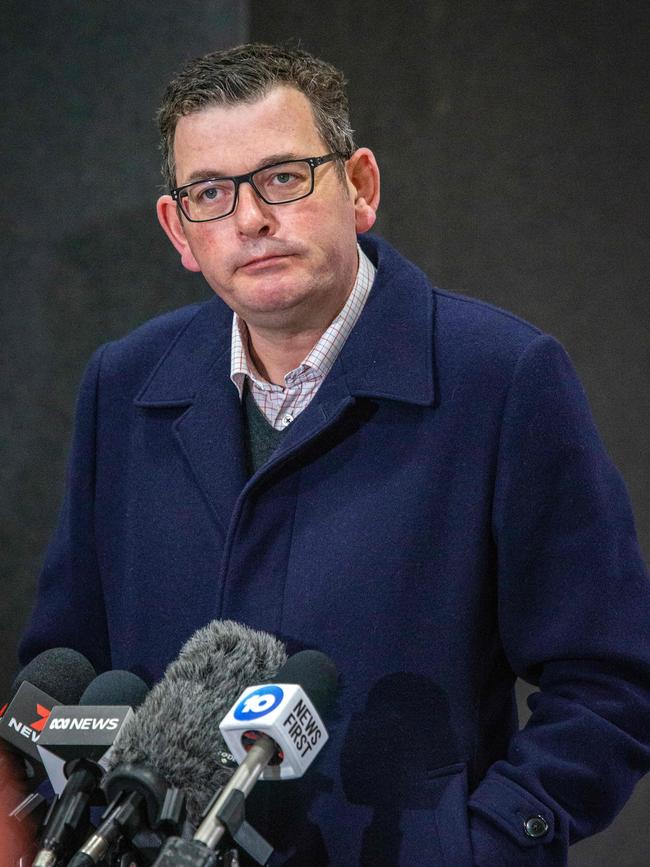The daily Dan is gone for good in bid to stick around
The North Face jacket is gone. Dan Andrews has resurrected his battered premiership as Gladys Berejiklian faces her biggest test.

The Daily Dan is dead.
The North Face jacket is at the bottom of the Victorian Premier’s washing basket.
Long gone is the sharply rising death toll that left its black stain on 2020.
In its place is the new Dan Andrews, with a tailored, mid-length Collins St winter coat plus a fetching bomber jacket, just a few public appearances a week and a series of carefully targeted lines that are part of an intriguing political resurrection.
While Gladys Berejiklian is battling a worrying, statewide breakout, Dan is back on the front foot.
As a couple of protesters interrupted Andrews at a press conference this week, he turned to the cameras and offered something for the haters. “People are entitled to their views. That is fine. But whether you support me and my team or not, we will do everything we can, every hour of the day, to keep you safe,” he said.
In other words, you don’t have to like him to vote for him.
Perhaps he might also be a head kicker, but he is the people’s head kicker.
A year ago today, Andrews was knee deep in Australia’s worst health crisis in many decades, his political fortunes collapsing as the death toll climbed.
His government was in total chaos and his grip on the premiership weakened.
The hotel quarantine system was inadequate and there were deep concerns about whether the bureaucracy from chief health officer Brett Sutton down was up to the job of defeating the virus after the government had failed for years to properly resource public health.
Cabinet members – even Andrews – were wondering out loud where it was all going to end and whether or not they had the cattle to do the job.
On Sutton, who remains large and in charge, a Labor figure with intimate knowledge of the events said: “How he hasn’t been necked through this process has been a product of him being the public face of the pandemic.”
“Dan put him on a pedestal and had to stick with him.”
As the hate rained on Andrews from Canberra and Sydney in August, September and October last year, the critics were underestimating both Andrews and the effect the crisis was having on the people.
Not Andrews.
Every single word uttered in his ultra-marathon press conferences in the blackened theatrette was a building block for 2021 and part of a borderline unhinged desire to continue to run a state and emerge to win the 2022 Victorian election. Even, it seems, the words he cocked up were working for him.
In 2014, Andrews changed his political name from Daniel to Dan, dumped the young fogey look and funked himself up. He’s done the same in 2021 but with more subtle changes after being off work for months with broken ribs and a broken back.
Focus groups in Melbourne in 2021 run by the strategy group Redbridge have revealed very strong support for Andrews despite the 2020 wave and Labor’s role in it.
“He’s viewed by the public as the right politician for the current crisis,” said Redbridge political strategist Kos Samaras, who for years was an integral part of the seemingly bulletproof Victorian Labor machine.
His critics would say that if Andrews were to face a yearly performance review, he would be marked as an over-achiever on political strategy but a mixed performer on policy; a work colleague enemies accuse of playing dirty.
“The streets of Melbourne are littered with bodies … there’s a very large number of caucus members and ministers who have been savaged by Dan Andrews over the years,” a Labor figure said.
Many of these people were once his friends, including former special minister of state Gavin Jennings, former boss and factional player Alan Griffin, former health minister Jenny Mikakos, former finance minister Robin Scott, former emergency services minister Jane Garrett. The list goes on.
For years he has been in a silent war against some of the dominant media people in Melbourne.
God help Transurban and the other players involved in Melbourne’s $10bn West Gate Tunnel fiasco, which this week blew out in cost by up to $5bn. There will be no prisoners.
But from personal experience, Andrews is a walking contradiction; capable of great compassion in personal crises; less so when it comes to daily politics.
The saying around Spring St is that no matter how much money gets wasted or questionable decisions are made, Dan always wins.


This is so because even his harshest critics accept Andrews, 49, is a provincial king of political strategy who changes colours like a chameleon.
While there are many similarities between Andrews and former Liberal premier Jeff Kennett, there is one stark difference, according to those who know both men.
While Andrews is passive aggressive and rarely forgives, Kennett was aggressive but with a much greater capacity to move on.
“You just have to keep out of his way, and do exactly what he says,” a minister said of Andrews.
Another former close friend, using unprintable language, utters: “There’s no loyalty to the man. Unless you are a billionaire. Or he desperately needs you.”
None of which takes away from a fundamentally new position Andrews has created for himself in the wake of his fall down a set of steps on the Mornington Peninsula in March.
The break may even have helped him politically, with 2020 having overexposed Andrews to a traumatised community.
Andrews – nearly 11 years into his leadership – today finds himself back on top again, in a much stronger position than Scott Morrison and his beleaguered northern counterpart Berejiklian.
Who would have thought in 2020 that 2021 would have worked out this way?
Arguably Andrews’ biggest challenge politically is how he soothes a community close to emotional collapse, sparked by six lockdowns that have lasted for nearly 200 days.
Few cities in the world have faced such severe restrictions and there are no signs that lockdown 6.0 will end soon. Indeed, there is every indication that Victoria will continue to go in and out of these closures until a clear majority of people are double vaccinated.
Professor Patrick McGorry, an eminent psychiatrist and strong supporter of the Andrews government’s work on the mental health royal commission, warned of a “shadow pandemic” in which mental-health staff were being overwhelmed and royal commission recommendations needed to be acted upon.
“It’s like the battle of the Somme. We’re losing troops but we’re not replacing them fast enough,” he said.
The mental health of the community, he added, was in danger of crumbling.
“The system is worse than it was before the (Victorian) royal commission. The cavalry are coming but the cavalry are cantering rather than galloping, if I can put it that way,” McGorry said.
Which exposes the fundamental weakness of all governments during the pandemic.
How to deal with an increasingly traumatised electorate in the country’s two biggest cities, where millions of people have been locked down, in many ways against their wishes.
In Andrews’ case, he won’t be taking a backward step, raising the spectre on Friday of locking out unvaccinated people from everyday activities such as major events when the country pushes towards reopening, probably next year.
Andrews was typically blunt.
“Some people will be all up in arms from a civil liberties point of view (but) that’s not the issue here,” he said. “The issue here is keeping people safe.”
In times of fear, Andrews knows that the perception of safety – and who best to deliver it – will be everything.




To join the conversation, please log in. Don't have an account? Register
Join the conversation, you are commenting as Logout